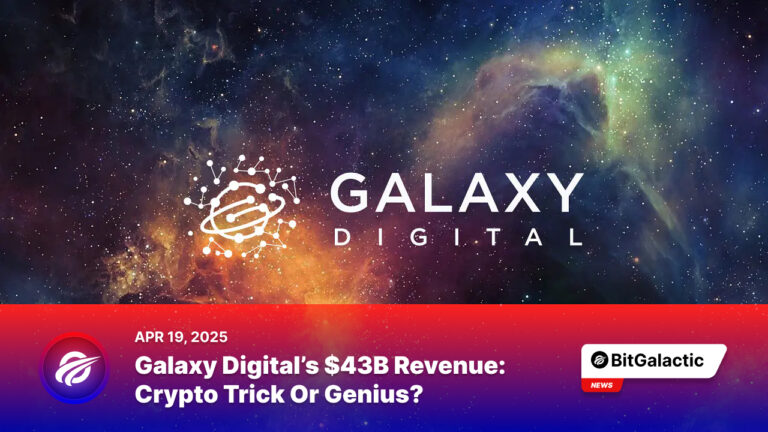Galaxy Digital’s $43B Revenue: Crypto Trick or Genius?
Wait a sec—Galaxy Digital, a crypto company, made $43 BILLION in revenue last year? That’s DOUBLE BlackRock, bigger than Netflix, Starbucks, and Visa! How’s a seven-year-old crypto firm pulling this off? I’m BitGalactic, your crypto guide with a decade in the game, and today, we’re diving into this wild story. Stick around—you won’t believe what’s really going on!
Alright, let’s break it down. Galaxy Digital, led by crypto OG Michael Novogratz, dropped jaws with their 2024 revenue: $42.6 billion. That’s enough to land them in the top fifth of the Fortune 500. For context, BlackRock, the world’s biggest asset manager, pulled in about $20 billion. So, how’s Galaxy doing this with just 520 employees? Spoiler: It’s not what it seems.
Here’s the deal: 99% of Galaxy’s revenue comes from ‘digital asset sales.’ Translation? When Galaxy trades Bitcoin, Ether, or stablecoins like USDT for clients—like big crypto exchanges—they count the FULL trade value as revenue. So, if they move $1 million in Bitcoin, that million hits their top line. Sounds crazy, right? But then, they subtract those trades as ‘transaction expenses,’ leaving a net income of $347 million. That’s still solid, but nowhere near $43 billion.
As someone who’s watched crypto evolve since 2015, this reminds me of how market makers operate. Think of Galaxy as a high-speed crypto middleman, providing liquidity for trades. It’s like a stock market maker counting every share’s value as revenue, not just their cut. Experts like Mark Palmer from Benchmark Co. and Matthew Foreman from Falcon Rappaport & Berkman back this up—they say it’s standard for market makers, whether in crypto, corn futures, or stocks.
Now, let’s zoom out. Galaxy isn’t just trading. They’ve got three divisions: Global Markets for trading and investment banking, Asset Management for client portfolios, and Digital Infrastructure, which includes Bitcoin mining. Their Global Markets arm alone pulls in fees and gains from digital assets, while Asset Management books unrealized gains on investments. This mix makes Galaxy a crypto powerhouse, but their revenue reporting? It’s a quirky crypto thing.
This isn’t the first time crypto’s made headlines for funky accounting. Back in 2017, during the ICO boom, startups reported massive ‘revenues’ from token sales, only for regulators to crack down. Galaxy’s approach is legal and transparent—they’re upfront in their SEC filings—but it shows crypto’s still figuring out how to play by traditional finance rules. Compare this to Coinbase in 2021, when their IPO revealed $1.8 billion in revenue, mostly from trading fees. Galaxy’s scale is bigger, but the principle’s the same: crypto trading volumes are INSANE.
Fast-forward to 2025, and crypto trading is hotter than ever. Per CoinGecko, global crypto trading volume hit $6.7 trillion in Q1 2025, up 20% from 2024. Galaxy’s riding this wave, especially as institutional players like hedge funds jump in. Their IPO filing signals confidence, but with Bitcoin hovering around $85,000 and volatility spiking, their revenue could swing wildly. My take? Galaxy’s betting on crypto’s growth, but their accounting style might confuse traditional investors.
So, what’s next? If Galaxy’s IPO pops off, they could redefine how Wall Street views crypto. But if markets crash, those digital asset sales could tank. I’m bullish long-term—crypto adoption’s only growing—but I’m curious: Do you think Galaxy’s revenue trick is genius or misleading? Drop your thoughts in the comments, and let’s predict: Will Galaxy crack the Fortune 100 by 2030? Vote in our poll!
That’s it for today’s deep dive! If you loved this breakdown, hit that subscribe button and tap the bell—we’re dropping crypto insights every week. Follow BitGalactic for the latest on Bitcoin, Ethereum, and the wild world of crypto. Let’s keep the convo going in the comments. See you next time!
Share this post


